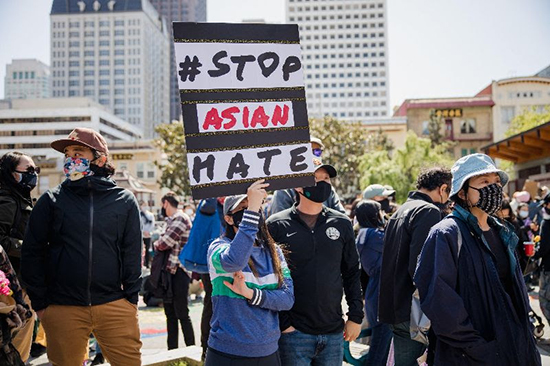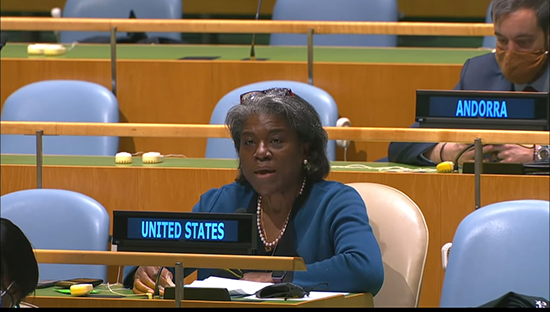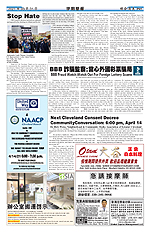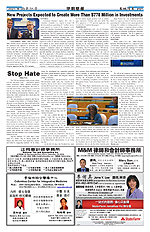|
 |
哥伦布、匹兹堡及各地消息
|
| |
Stop Hate
|
|
 |
| |
CIP's board of directors and staff are saddened and angered
by the shootings in Atlanta and the disturbing rise in anti-Asian
violence that has been reported over the last year. The #BLM and #StopAsianHate
movements are a painful and urgent reminder of the role that racism
has played in our country's history for far too long. CIP stands
against hate. Period.
CIP's mission of building bridges of understanding and tolerance
remains as important as ever and we will continue to strive toward
this goal, one person at a time. We continue to explore ways to
become part of the solution. Cross-cultural understanding is
critical; we will continue to build relationships at home and around
the world.
Recent remarks from U.S. Ambassador Linda Thomas-Greenfield
resonated with all of us at CIP and we encourage you to read what
she had to say at the link below. |
|
 |
Ambassador Linda
Thomas-Greenfield
U.S. Representative to the United Nations
New York, New York
March 19, 2021
AS DELIVERED
Thank you, Mr. President. Thank you for convening us to commemorate
this important day. And I thank the Secretary-General, Madam High
Commissioner, and Dr. Iweala, for your leadership in pressing us all
to do more toward the elimination of racial discrimination, wherever
and by whomever.
This meeting – this commemoration – is personal to me. I am a
person of African descent. But more importantly, I am a descendant
of slaves. My great grandmother Mary Thomas, born in 1865, was the
child of a slave. This is just three generations back from me.
I grew up in the segregated South. I was bused to a segregated
school, and on weekends, the Ku Klux Klan burned crosses on lawns in
our neighborhood. When I was in high school, I was asked by a little
girl, for whom I babysat, if I was an N-word because her dad had
used that word for me.
I know the ugly face of racism. I lived racism. I have experienced
racism. And I survived racism.
And through this process, I learned a simple truth: Racism is not
the problem of the person who experiences it. Those of us who
experience racism cannot, and should not, internalize it, despite
the impact that it can have on our everyday lives.
We must face it down, every time, no matter whom it’s directed
towards.
Racism is the problem of the racist. And it is the problem of the
society that produces the racist. And in today’s world, that is
every society. And in so many of our communities and countries,
racism is endemic. It’s built in, like a rot in a frame. And it
remains, and it festers, and it spreads because many of those in
charge allow it to. Others look away and pretend it’s not there. But
like a cancer, if ignored, it grows.
Today, we commemorate our joint commitment to end all racial
discrimination. And we take stock of our efforts during the midterm
review of the Decade of People of African Descent. In America,
conducting that review requires a reckoning – a reckoning with our
dark history of chattel slavery.
Four-hundred-and-two years ago, African slaves were forced onto the
shores of the colony of Virginia. Two years ago, the 1619 Project
brought attention to this anniversary, and put the consequences of
slavery, and the contributions of Black Americans, back at the
center of our history and of our national narrative. As the project
detailed, slavery is the original sin of America. It’s weaved white
supremacy and black inferiority into our founding documents and
principles.
The Legacy Museum in Alabama traces this history, and if you’ve not
been there, I encourage you all to take a trip. Its exhibits draw a
direct line from slavery to lynchings to segregation to mass
incarceration and testify to this terrible history and the impact it
is having on our people today.
But even though slavery is our original sin, America is not the
original source of slavery. Others share this shame with us. Slavery
has existed in every corner of the globe. Africans enslaved fellow
Africans long before the American colonists existed. And sadly, in
many places around the world, slavery still exists today.
As the scholar Isabel Wilkerson argues, humans in all contexts have
ranked human value, pitting the presumed supremacy of one group
against the presumed inferiority of others. In America, that takes
many forms. Chief among them: our legacy of white supremacy.
This year, the senseless killing of George Floyd, Breonna Taylor,
and so many other Black Americans sparked a reckoning with racial
justice, a movement that spread across the world: Black Lives
Matter.
And because Black Lives Matter, we need to dismantle white
supremacy at every turn. This means looking at other kinds of hate,
too.
The FBI has reported a spike in hate crimes over the past three
years – particularly against Latino Americans, Sikhs, Muslim
Americans, Jewish Americans, and immigrants. The most recent data
shows hate crimes rising to a level not seen in over a decade. And
that doesn’t even capture the bullying, discrimination, brutality,
and violence that Asian Americans have faced since the outbreak of
COVID-19.
The mass shooting in Atlanta is only the latest example of this
horror. At President Biden’s direction, we are flying our flag at
half-staff at the U.S. Mission to the United Nations, to honor the
victims of this terrible, senseless tragedy.
It is so important we stand together – we stand unified – against
this scourge. In unity, we have strength. But divisions and
misperceptions about each other work against all of us.
We also need to recognize that racism is far from unique in America.
Across four decades and four continents in the Foreign Service, I
experienced racism in countless international contexts, from overly
zealous searches at airports, to police racially profiling my son,
to being made to wait behind white patrons for a table at a
restaurant. Racism was and continues to be a daily challenge
wherever we are.
And for millions, it’s more than a challenge. It’s deadly. Like in
Burma, where Rohingya and others have been oppressed, abused, and
killed in staggering numbers. Or in China, where the government has
committed genocide and crimes against humanity against Uyghurs and
members of other ethnic and religious minority groups in Xinjiang.
The prevalence, and pervasiveness, of racial discrimination might
make the situation look hopeless. But let me be clear: I remain
hopeful. I am hopeful because I have seen how communities and
countries can enact change. And I have experienced that progress in
my own lifetime.
Personally, I am just one example of what hope and strength can do.
After all, this descendant of slaves is before you today as the U.S.
Representative to the United Nations. The first chapter of my life
story – born in poverty to uneducated parents – this could not have
been predicted.
So I ask, what can we do to promote change and keep hope alive for
victims of racism?
We can’t control the hate in people’s heart. But we can change the
rules that give them license. That’s how I’m sitting here. It’s why
we were able to welcome Vice President Kamala Harris to the UN this
week. It’s why President Biden’s cabinet is the most diverse in
history and includes the first Native American named to a cabinet
post.
We can make our communities, and our governments, reflect our
highest aspirations – even if some individuals still fall short. We
can act. And in the Biden-Harris administration, we are doing just
that.
In the first 60 days, the President has made this a priority: from
redressing racial discrimination in housing, to ending private
prisons that warehouse young black and brown men, to respecting the
sovereignty of Native American tribes, to combatting xenophobia and
discrimination against Asians, Asian Americans, and Pacific
Islanders.
The Biden-Harris Administration also recognizes how the COVID-19
pandemic and economic crisis has been disproportionately damaging to
members of racial and ethnic minorities. So, we have taken steps,
like providing emergency relief funds, increasing access to
nutritious food, and passing* federal student loan payments, that we
know will particularly help Black and brown communities.
To be clear, this is just the beginning. Ending racial
discrimination, particularly in our criminal justice system, will be
an ongoing top priority for the President, and for the entire Biden-Harris
Administration. And we ask that other countries join us.
We call for all countries to ratify and implement the International
Convention on the Elimination of All Forms of Racial Discrimination.
After all, this is about shaping the future. It’s shaping the future
we want for our children, and our grandchildren, and their
grandchildren.
Already, they are demanding we do better. They are coming up with
new ideas and they’re pushing for progressive action. They’re asking
more from their politicians and their governments. And they’re in
the streets, marching for charge.
They say that “Black Lives Matter.” Because they do.
They chant: “This is what democracy looks like.” Because it is.
This is the American way.
We have flaws. Deep, serious flaws. But we talk about them. We work
to address them. And we press on, in hopes that we can leave the
country better than we found it.
We can do the same on a multilateral scale. Let us expose the
racism and racial discrimination endemic in every society, around
the globe. Let us press forward, to root out that discrimination and
remove the rot from our foundations. And on this day dedicated to
ending racial discrimination, as our flags fly at half-staff, let us
leave our children a less hateful, more hopeful world.
Let us give them a future. A future without fear. A future without
violence. That is the legacy that I hope they can inherit.
Thank you.! |
| |
|

 |
| |
| |
| |
| |
| |
| |
| |
| |
| |
| |
| |
| |
| |
| |
| |
| |
| |
| |
| |
| |
| |
| |
| |
| |
| |
| |
| |
| |
| |
| |
| |
| |
| |
| |
| |
| |
| |
| |
| |
| |
| |
|